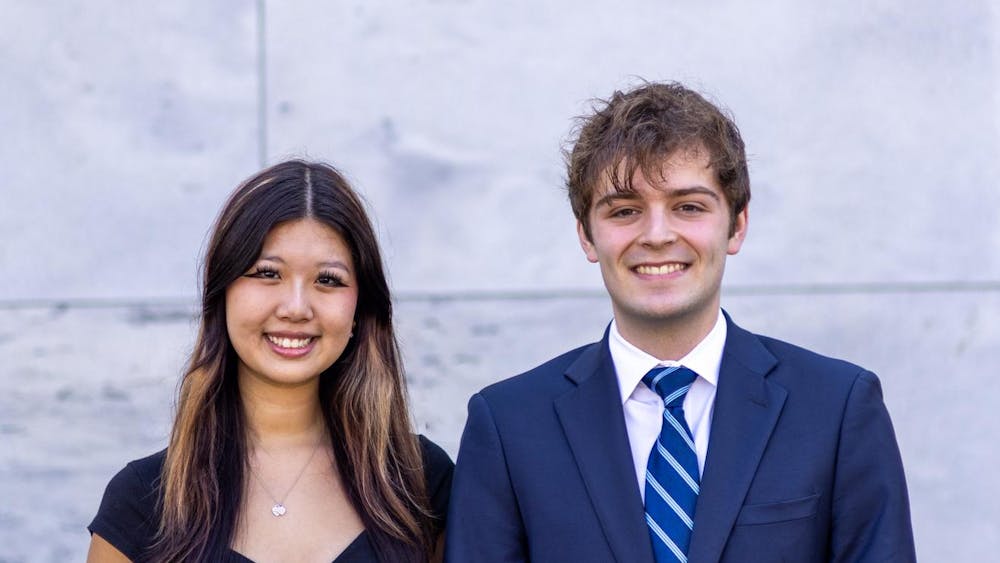The Student Government Association (SGA) hosted Emory University’s first-ever Wellness Open House on Oct. 3. The town hall-style meeting covered COVID-19, monkeypox, reproductive health and mental wellbeing.
The event featured Chief Resilience Officer Amir St. Clair, Executive Director of Student Health Services Sharon Rabinovitz and Associate Vice President for Health, Well-being, Access and Prevention James Raper. Each speaker gave a presentation and answered questions from the student body. About 100 students attended either on Zoom or in Convocation Hall.
SGA President Noah Marchuck (24C) and SGA Vice President Aditi Vellore (21Ox, 23C) said they were first inclined to organize the Wellness Open House when Roe v. Wade was overturned on June 24, leaving the legality of abortion access up to states.
“I wanted initially for it to be about reproductive resources and what reproductive rights are still intact after everything,” Marchuck said.

Vellore had a similar perspective, saying that she and Marchuck were brainstorming ways to inform students about the new regulations.
“Once we started hearing about monkeypox cases increasing and COVID-19 getting bad during the beginning of the semester, we were like ‘Oh, why not make this into a wellness event?’” Vellore said.
St. Clair, who has handled Emory’s COVID-19 response, kicked off the Wellness Open House by dicussinghow protocols have evolved since the beginning of the pandemic.
“We’re starting to layer back those restrictions and try and emphasize more education, making good decisions and leaning on the tools that are already in place,” St. Clair said.
Emory will continue to refer to public health guidance from the Centers for Disease Control and Prevention, Georgia Department of Public Health, county health departments and University experts, St. Clair said. He added that he hopes students will be cognisant of the cyclical nature of COVID-19 and stay on the lookout for any new variants.
Next, Rabinovitz presented on monkeypox, a virus that is spread primarily through skin-to-skin contact and was declared a national health emergency in August. She discussed its symptoms, which include fever, headache, and a rash. In the case of possible exposure, Rabinovitz recommended that students get tested through Student Health Services (SHS). In order to help stop the spread of the virus, she urged students to avoid skin-to-skin contact with symptomatic individuals, use hand sanitizer, and avoid sharing drinks, towels, or bedding.
Discussing the mental impact the three-week monkeypox isolation period might have on students, Rabinovitz emphasized resources such as Counseling and Psychological Services and TimelyCare TalkNow.
“It’s really important to have the support you need in isolation,” Rabinovitz said.
She then spoke about what reproductive rights have and have not changed since the overturning of Roe v. Wade. Abortions are now banned beyond six weeks of pregnancy in Georgia, unless the mother is at risk of serious harm or death, or in cases of rape or incest where a police report was filed.
“There are a lot of days in our lives that are like ‘I remember where I was when …,’ and this is one of them,” Rainovitz said.
Services such as diagnostic imaging, in vitro fertilization and non-obstetric care or medication for pregnant people are still legal in Georgia. Student Health Services will continue to offer resources such as contraceptives, pregnancy detection and counseling for unplanned pregnancies, Rabinovitz added.
“So what is changing?” Rabinovitz asked. “It is the consistent and intentional messages that we do as a community.”
The University will work with students to help them meet any financial needs related to reproductive care, Rabinovitz said. For those under the Emory University Student Health Insurance Plan (EUSHIP), costs for abortion services, contraception and out-of-state travel will be covered. For those not covered by EUSHIP, Student Case Management and Intervention Services can be utilized for additional aid.
Raper, who arrived to Emory in June 2022, wrapped up the town hall with his thoughts on how to improve student mental health. He started by defining wellbeing as involving the Emory community as a whole.
“How well are we as an organism, as an ecology?” Raper asked.
Raper then questioned what wellbeing looks, sounds and feels like for traditionally marginalized communities.
“Most universities traditionally are constructed to be a more ‘well’ place for folks who hold a lot of privilege,” Raper said.
Additionally, Raper presented a survey of how student mental health at Emory compares to national averages. The data showed that the 700-800 Emory students who voluntarily participated in the survey scored from 1.5% to 8% lower than the national average for the following statements: “I belong at my college,” “students’ health and well-being is a priority at my college,” “campus climate encourages free and open discussion of students’ health and well-being” and “we are a campus where we look out for each other.”
Raper said he hopes to eliminate the often unintentional barriers that prevent students from accessing support services. His goal is to help every student bring their full selves to Emory and the world they enter upon graduation.
The Wellness Open House provided students with the chance to hear from experts and voice any concerns.
“There are so many issues going on in our society today,” Vellore said. “We wanted to create this event to make sure that people are better informed.”








